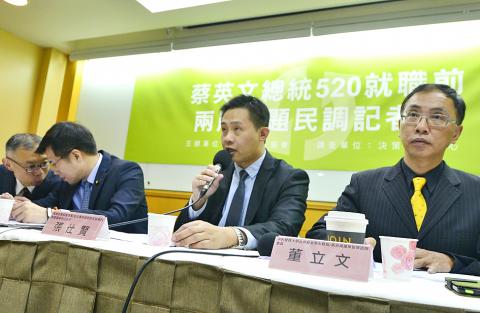
(TibetanReview.net, Apr16, 2016) – Beijing’s assertive policies marked by threats, intimidation and increasing controls over the Special Administrative Region of Hong Kong and the de facto independent territory of Taiwan appear to be having quite the opposite effect, with calls for self-determination or even independence growing ever louder. In the case of Taiwan, most of its citizens no longer subscribe to the “one China” policy, or the idea that Taiwan is part of China, reported taipeitimes.com Apr 15, citing a survey conducted by the Taiwan Cross-Strait Policy Association.
The survey was reported to reveal that 59.7 percent of respondents did not want president-elect Tsai Ing-wen to “state in her inauguration speech that both sides [of the Taiwan Strait] belong to ‘one China’.” Only 22 percent were reported as saying “she should.”
The result of the survey was released by association secretary-general Anson Hung at a news conference in Taipei.
“Asked if they think Tsai should give in if China openly threatens to reduce the number of Chinese tourists to Taiwan, 60.4 percent said they still believed that she should not say Taiwan and China are parts of ‘one China,’ while 24.7 percent said she should,” Hung was quoted as saying.
The report quoted Democratic Progressive Party (DPP) Legislator Lo Chih-cheng as telling the news conference that the results of the association’s survey were similar to those of other polls conducted by other organizations, as well as the Mainland Affairs Council.
Lo was further quoted as saying, “Leaders of a democracy should act according to the will of the majority, and the poll shows that Beijing’s idea of ‘one China’ is unacceptable to most people in Taiwan, and it would be difficult for Tsai to go against the majority.”
Referring to China’s perverted definition of self-determination, Chiu Chui-cheng, an associate professor at National Quemoy University’s Department of International and Mainland China Affairs, has said that China often calls on Taiwan to respect the opinion of its 1.3 billion people. And he has asked: but “what qualification does the Chinese leadership have to make that call when it does not even respect the opinions of its people and restricts the freedom of speech?”
Tsai, who takes over as the President of Taiwan in May, has insisted that the core of her cross-strait policy is maintaining the “status quo”. And she has refused to recognize the so-called “1992 consensus” of the two sides subscribing to the idea of “one China” but with their own different interpretations. Beijing has stepped up its calls for Tsai to abide by the “consensus” while threatening that refusal to do so may lead to serious consequences in cross-strait exchanges, the report noted.
Earlier, on Apr 10, a group of student activists who rose to prominence during Hong Kong’s 2014 pro-democracy movement launched a new political party, called Demosisto. The party promised to use non-violent resistance in the fight for self determination and to hold a referendum in 10 years’ time to allow the special administrative region’s seven million eligible voters to decide their own fate, including in favour of independence.


